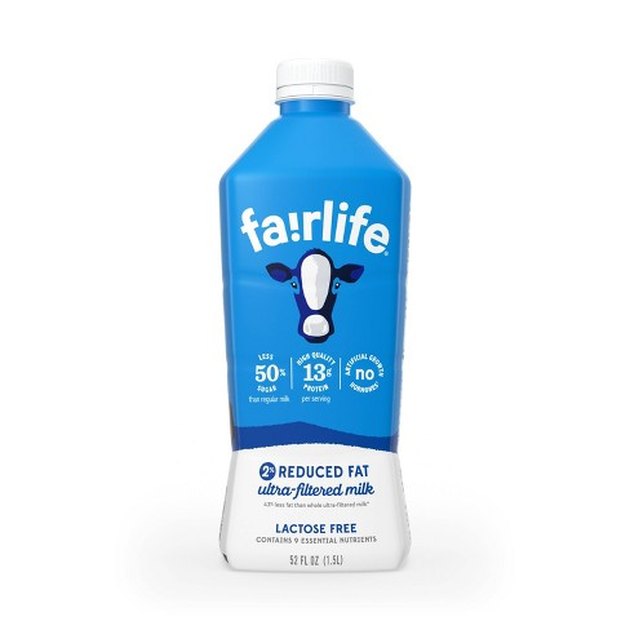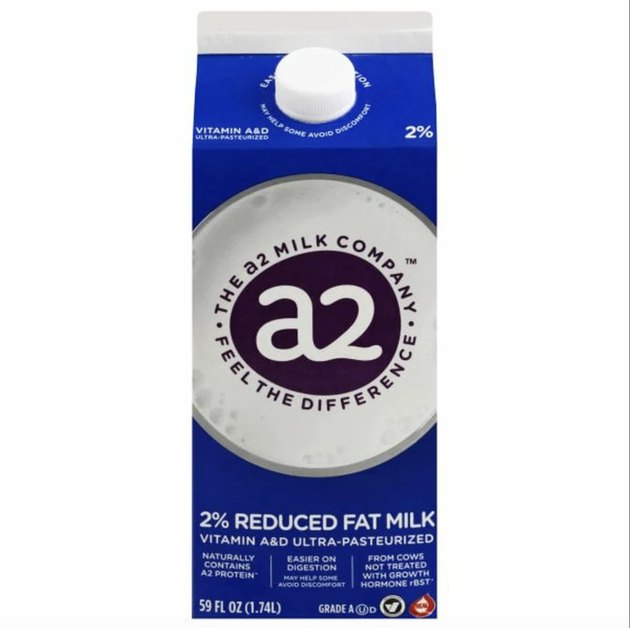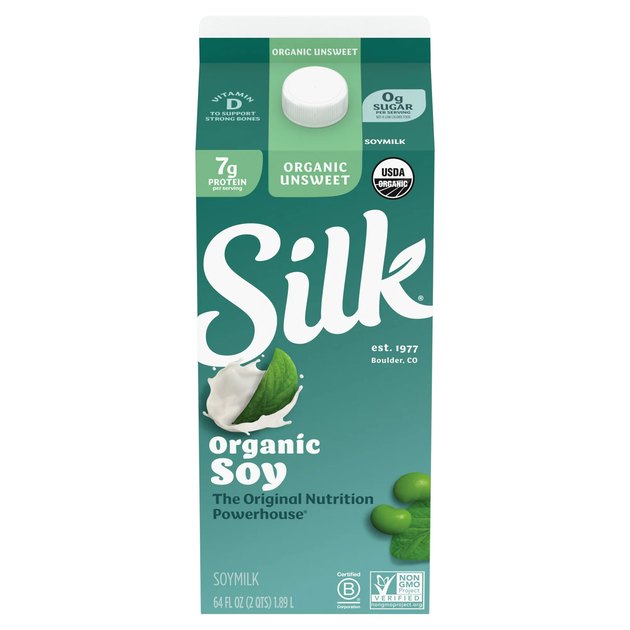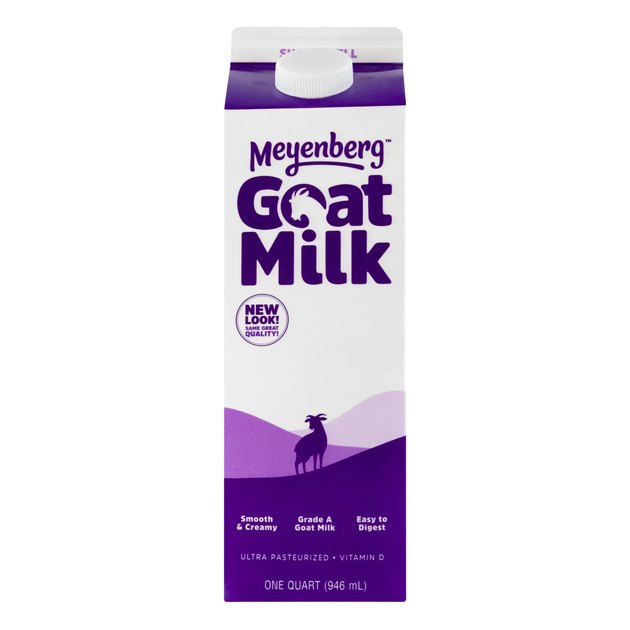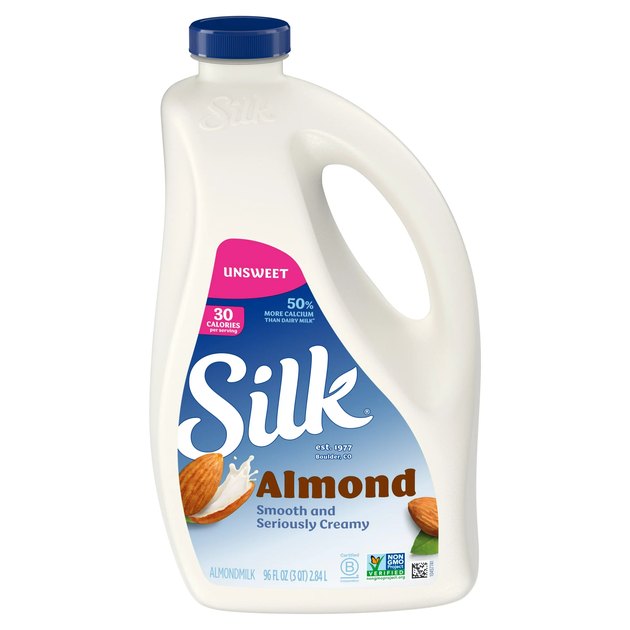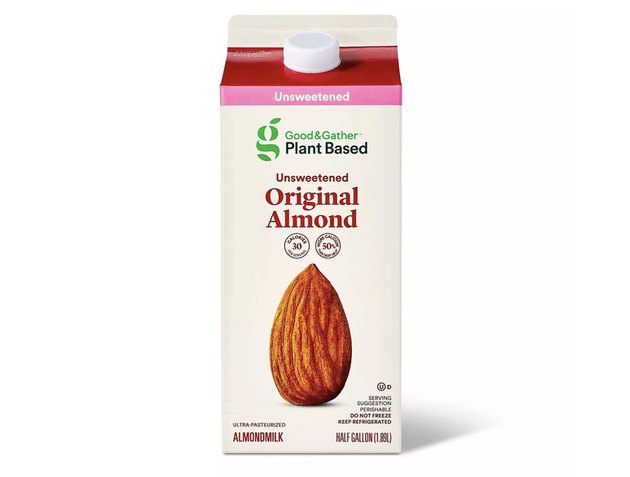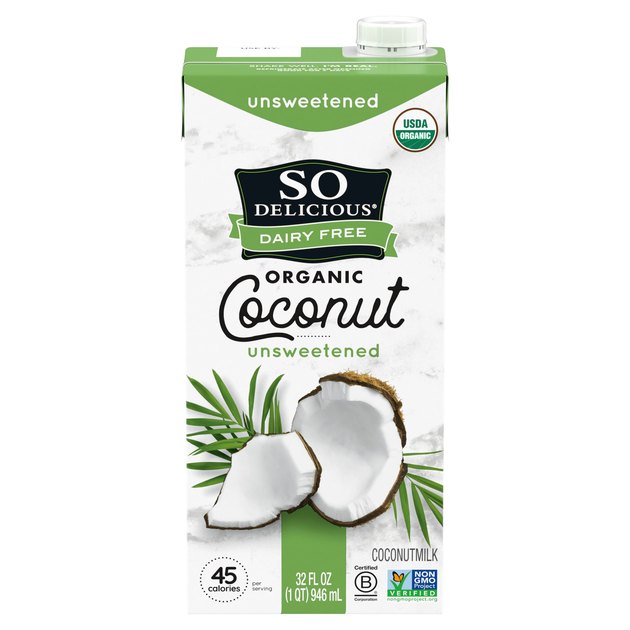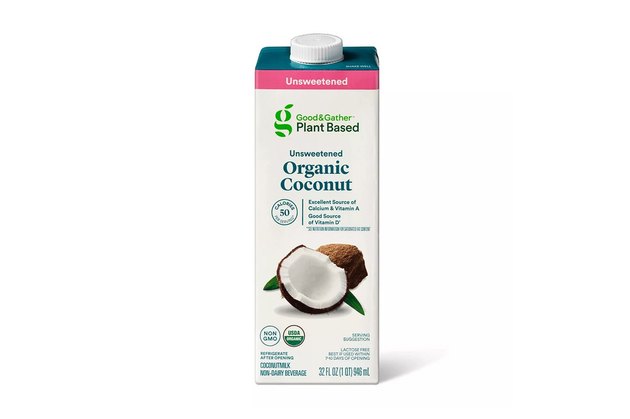
The dairy case — that vast sea of beautifully designed cartons of milk and milk alternatives that make you wish you had refrigerator space for all of them. Whether you are a loyal cow's milk drinker or have opted for a plant-based milk, each has its own benefits for health and for your weight-loss goals.
Here, we'll look at the weight-loss benefits of milk, explore why cow's milk gets the nod as the best milk for weight loss and then get into the best milks to buy when you're trying to lose weight.
Video of the Day
Video of the Day
Weight-Loss Benefits of Milk
Believe it or not, milk has been studied quite extensively for its benefits on weight loss. Most of the literature has been focused on cow's milk and on three key nutrients — protein, vitamin D and fat.
Plant-based milks often have similar nutrient profiles due to fortification, which means nutrients have been added in. It's important to read the label of the milk you choose to see which nutrients that particular brand is fortified with.
1. High in Protein
In order to lose weight without losing muscle (aka healthy weight loss), you need to maintain a higher level of protein. Having adequate protein in the diet also helps you burn more energy (calories) at rest.
Your energy expenditure is made up of three things — resting energy expenditure (the energy used for basic bodily functions), physical activity and thermic effect of food or diet-induced thermogenesis (DIT). DIT is the energy burned by digesting and absorbing food. Your DIT is increased with protein intake, according to September 2020 research in the Journal of Obesity and Metabolic Syndrome.
When looking at a milk for weight loss, check to see how much protein is in your milk. More protein can also lead to greater satiety, which can keep you fuller for a longer period of time (meaning you're less likely to reach for an unhealthy snack).
2. Nutrient-Dense
Milk is a convenient way to get a good amount of necessary daily nutrients, which is especially important when your diet is more restricted than usual (i.e. you're eating fewer calories in order to lose weight).
Here are the nutrient highlights in a glass of cow's milk (2 percent), according to the USDA:
- Calories: 122
- Protein: 8.23 g
- Carbohydrates: 12 g
- Fat: 4.66 g
- Calcium: 309 mg
- Magnesium: 29.4 mg
- Potassium: 390 mg
- Zinc: 1.05 mg
- Folate: 4.9 mcg
- Choline: 44.6 mg
- Vitamin B12: 1.35 mcg
- Vitamin A: 203 mcg
- Vitamin D: 111 IU
Research has found a link between low levels of vitamin D and obesity, but it's not yet clear whether low D is a contributing factor for obesity or whether obesity is a contributing factor to having low vitamin D.
In a double blind clinical trial, 50 women with overweight and obesity (the study used the term "women") were provided with vitamin D supplementation of 50,000 IU per week for six weeks and they saw significant decreases in weight, waist circumference, hip circumference and BMI, according to July 2018 results in the International Journal of Preventive Medicine.
The role of vitamin D in weight loss is not conclusive, but getting enough vitamin D every day is important for your overall health, so you should choose a milk fortified with the nutrient.
3. Filling Fat
The subject of fat in your milk is pretty controversial. The American Heart Association and the Dietary Guidelines for Americans encourage the consumption of low-fat dairy. This is because the fat in dairy and even some plant-based milks, such as coconut milk, are sources of saturated fat.
Milk fat is mainly comprised of short-chain and medium-chain saturated fatty acids, which are different from the type found in meat, for example. Coconut fat is also predominantly made of medium-chain as well.
Research is indicating that milk fat does not increase the risk for cardiovascular disease, according to September 2018 research in The American Journal of Clinical Nutrition.
The research on the weight-loss effects of consuming full-fat dairy is not focused on milk specifically, but on all dairy products in general. Multiple review studies have not been able to find an association between eating full-fat dairy — in sources like yogurt and milk — and weight gain, according to a July 2020 systematic review in Advances in Nutrition. The higher fat content, in addition to the protein mentioned above, helps increase satiety as well.
The Best Milks for Weight Loss
1. Cow's Milk
Pros
- Widely available
- High in protein
- Nutrient-dense
Cons
- Lactose is a problem for some people
- Contains saturated fat
Cow's milk gets the nod for the best milk for weight loss, due to the amount of research behind it and its nutrient profile. If you're on a calorie-restricted diet but still want the benefit of traditional dairy milk's fat satiation, feel confident choosing a 2 percent milk over whole. Either way, you're still getting 8 grams of protein per cup.
If you're lactose intolerant, you're in luck, because many brands are ultra-filtered to take out the lactose, but you are still left with all of the nutrients that make this drink a powerhouse.
In addition, there's another type of cow's milk that only contains the A2 protein. Usually, cow's milk contains both an A1 and A2 protein. A recent randomized controlled, crossover study looked at the gastrointestinal discomfort of people who had self-reported lactose intolerance. The researchers found the people had less discomfort with the A2 milk over the conventional milk, according to 2016 research in Nutrition Journal.
2. Soy Milk
Pros
- High in protein
- High satiety
Cons
- Many contain added sugar
Soy milk is a solid choice for those wishing to lose weight. The research isn't as extensive as dairy milk, but most of the benefits of soy milk center around its ability to help you feel full, according to a November 2019 review in Nutrients.
That feeling of satiety comes from the protein content in soy milk — 7 grams of protein in one cup. If you choose an unsweetened type, you also don't have to worry about added sugar. Depending on the brand, you will find a variety of nutrients. Look for one that fortifies the soy milk with calcium, vitamin D and vitamin B12 at a minimum — bonus points for extra B vitamins, potassium and vitamin A.
3. Goat Milk
Pros
- High in protein
- Some people tolerate it better than cow's milk
Cons
- Highest in fat
- Low in vitamin B12
Goat milk has a similar nutrient profile to cow's milk with a few exceptions. It has just as much protein with similar amounts of calcium, but it is lacking adequate amounts of vitamins B12, B6 and folic acid in comparison to cow's milk, according to an extensive 2017 review in the Journal of Dairy Science.
Some people find they're able to digest goat milk better than cow's milk. This doesn't have to do with lactose — because they both contain lactose — but rather the smaller amounts of the A1 protein in goat milk, according to 2017 research in the Korean Journal for Food Science of Animal Resources.
4. Almond Milk
Pros
- Low in calories
- High in calcium
Cons
- Low in protein
Almond milk is a trendy option for many due to its low calorie content — only 30 calories per cup in unsweetened almond milk, making it a great choice for hydration. Unlike cow's milk, though, it's not high in protein, clocking in with only 1 gram per cup, so you'll need to make sure you're getting enough of that macro elsewhere in your diet.
Almonds naturally contain calcium, but most almond milks have additional calcium and vitamin D to bump up their nutrient profile. Look for other fortified nutrients as well, including vitamin B12, vitamin A and iron.
5. Coconut Milk
Pros
- Low in calories
- High satiety
Cons
- Low in protein
Coconut milk can be a great plant-based alternative to drink while you're losing weight. It's important to note that when choosing coconut milk as a replacement for dairy, you should opt for the coconut milk in the refrigerated section, not the one in a can that you use to make curry.
The fat in coconut milk can leave you feeling satiated for a minimal calorie amount. Coconut milk also makes a great non-dairy alternative to traditional coffee creamer.
6. Other Plant-Based Milks
There are so many plant-based milks to choose from — flax, oat, hemp, rice. Most plant-based milks are low in calories but also low in protein. These make them especially great for hydration.
The majority of plant-based milks are fortified with some of the "must-haves" of milk, including calcium, vitamin D and vitamin B12 — all of which are very important for those following a vegan diet. The Food & Drug Administration has authorized plant milks and dairy milks to contain up to 84 IU of vitamin D per 100 grams, which equals about 200 IU per cup.
Always look on the label, though, because fortification is optional.
Comparison of Milks for Weight Loss
- Journal of Obesity and Metabolic Syndrome: "Clinical Evidence and Mechanisms of High-Protein Diet-Induced Weight Loss"
- International Journal of Preventive Medicine: "Effect of Vitamin D Supplementation on Weight Loss, Glycemic Indices, and Lipid Profile in Obese and Overweight Women: A Clinical Trial Study"
- Dietary Guidelines for Americans
- American Journal of Clinical Nutrition: "Serial Measures of Circulating Biomarkers of Dairy Fat and Total and Cause-Specific Mortality in Older Adults: The Cardiovascular Health Study"
- Advances in Nutrition: "Whole-Fat or Reduced-Fat Dairy Product Intake, Adiposity, and Cardiometabolic Health in Children: A Systematic Review"
- Nutrition Journal: "Effects of Milk Containing Only A2 Beta Casein Versus Milk Containing Both A1 and A2 Beta Casein Proteins on Gastrointestinal Physiology, Symptoms of Discomfort, and Cognitive Behavior of People with Self-Reported Intolerance to Traditional Cows’ Milk"
- Nutrients: "Soy Products Ameliorate Obesity-Related Anthropometric Indicators in Overweight or Obese Asian and Non-Menopausal Women: A Meta-Analysis of Randomized Controlled Trials"
- Journal of Dairy Science: "A 100-Year Review: Advances in Goat Milk Research"
- Korean Journal for Food Science of Animal Resources: "Hypoallergenic and Physicochemical Properties of the A2 β-Casein Fraction of Goat Milk"
- FDA: "Vitamin D for Milk and Milk Alternatives"
- USDA: "Milk, reduced fat, fluid, 2% milkfat, with added vitamin A and vitamin D"
